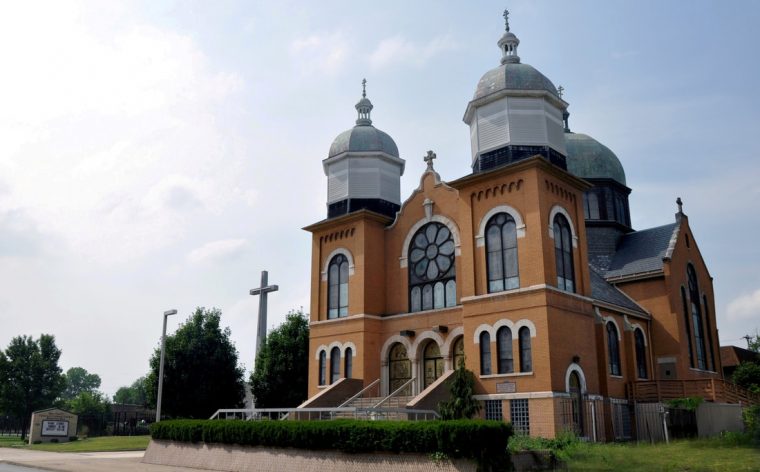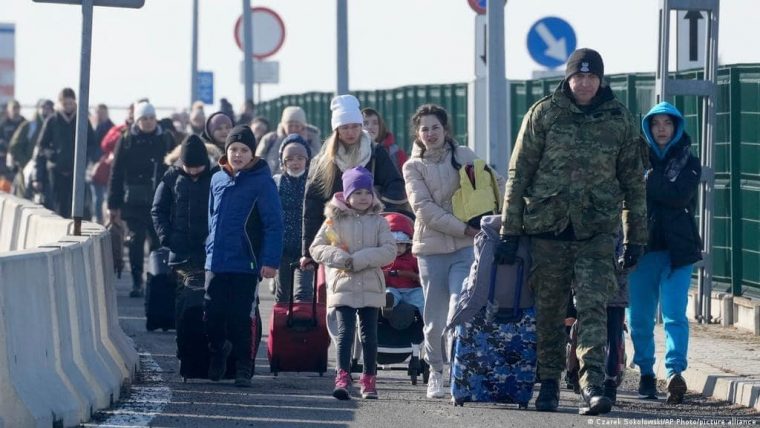Local Ukrainians urge military, humanitarian aid. Conflict sets off a political chain reaction in Ohio and the Mahoning Valley.
When the Russian army attacked Ukraine on Feb. 24, it set off a political chain reaction that has reached as far as Ohio and the Mahoning Valley. With one of the largest populations of Ukrainian descendants in the country, the war has especially touched the Buckeye State.
Ukrainian churches and cultural institutions are speaking out about their concerns, with the potential to influence the economy, the midterm elections and U.S. Senate race in Ohio.
Outside of the Cleveland area, the Mahoning Valley contains two of the largest communities (Austintown and Youngstown) of Ukrainian descendants in the state. According to the 2019 American Community Survey, over 3,000 Ukrainian descendants live in Mahoning County.
The political situation surrounding Ukraine and Russia has been on the mind of the Rev. Lubomir Zhybak, who is administrator of two local Ukrainian Catholic churches, Youngstown’s Holy Trinity and St. Anne’s in Austintown. The parishes are the spiritual home to approximately 70 families each.
On Jan. 31, Zhybak, who was born and raised in Ukraine, wrote a letter to Fox News host Tucker Carlson protesting what he called Carlson’s “seemingly biased anti-Ukrainian statements.” During the Jan. 24 broadcast of “Tucker Carlson Tonight,” Carlson asked, “Why is it disloyal to side with Russia but loyal to side with Ukraine?”
In the text of the letter, which was also posted to Holy Trinity’s Facebook page, Zhybak wrote, “My native country is a strong ally of the United States and to question whether the U.S. should side with Russia or Ukraine in the current conflict between the two countries sounds to me the same as to question whether the U.S. should side with North or South Korea amidst their current relations.”
Zhybak said he hasn’t received a response from Carlson. However, local and state representatives have reached out. U.S. Sen. Sherrod Brown’s office invited Zhybak to a Zoom call, which lasted approximately 40 minutes. “The message to Senator Brown was, basically, please do more,” Zhybak said. “This is not enough.” The Ukrainian priest said he emphasized the need for military aid. “He heard us.”
U.S. Rep. Tim Ryan also phoned. Zhybak said he has not heard from U.S. Sen. Rob Portman, who is co-chairman of the Ukraine Caucus. “My message to the politicians would be please put all the politics aside. Help Ukraine militarily as much as you can.”

The Mahoning Valley is home to three Ukrainian churches, including Sts. Peter and Paul Ukrainian Orthodox Church on N. Belle Vista Avenue in Youngstown, which is the spiritual home to approximately 100 families. The church has been raising humanitarian aid for Ukraine since before the invasion, said the Rev. Ivan Tchopko.
While politicians have visited the church since the invasion began, he wishes more had been done sooner. When asked about the raft of sanctions leveled against Russia, he responded: “Too late. We needed that before.”
Tchopko has been anticipating the need for resettling some of the now estimated 3 million Ukrainian refugees. This is where he sees a role for political representatives. “We wish they would have acted with more aggressive actions before the war started, but now we need their support, because there will be refugees coming here to the U.S. We will need their support to help place them in parishes and with jobs.”

On March 17, Ohio Gov. Mike DeWine opened the Ohio Summit on Ukrainian Refugees at St. Vladimir Grand Hall in Parma. According to a media release from DeWine’s office, more than 110 people attended, representing at least 60 organizations, including resettlement agencies, faith-based organizations, charities and others with an interest in the well-being of Ukrainians. The Ohio Department of Job and Family Services hosted. A recording of the summit can be found at http://ohiochannel.org.
Ryan and Portman have both signed a letter asking the Biden administration to grant Temporary Protected Status to Ukrainians fleeing the Russian invasion. TPS is a program designed to give migrants from countries deemed unsafe the ability to live and work in the U.S. on a temporary, though renewable, basis.
There are currently over 1 million people of Ukrainian descent in the United States. The largest share of Ukrainian descendants in Ohio, which has somewhere near the fifth largest population of any state, live in the Cleveland area.
How many live in Ohio is the subject of some debate. Estimates have ranged as high as 80,000. New Jersey-based The Ukrainian Weekly, one of the oldest English-language Ukrainian newspapers in the country, estimates the number at closer to 47,000.
“It’s complicated,” said Andrew Fedynsky, director of the Ukrainian-Museum Archives in Cleveland’s Tremont district. While the Parma area, home to the largest population of any city in the state, plays host to both Ukrainian Catholic and Baptist churches, there’s also a sizeable Jewish community of Ukrainian descent, he said. “A significant portion of Ohio Jews trace their heritage to what was then Czarist Russia and what is now Ukraine.”
From his perch at the Ukrainian-Museum Archives, which he has overseen for over three decades, Fedynsky has been watching the political situation carefully since long before the invasion.
Though he said Ukrainian Americans appreciate the show of support from across the state, Fedynsky’s heard a similar refrain when it comes to what they want to see from their representatives. “Support Ukraine morally, materially and militarily.”
Since the invasion, Fedynsky says he’s gratified to see the outpouring of support for Ukraine and the country’s independence, but that support didn’t immediately reach into some corners of the Republican Party, where Ohio’s Ukrainians have been traditionally well represented.
Fedynsky mentioned both former President Donald Trump and Senate candidate J.D. Vance as examples of Republican political figures who have acted as apologists for Russian President Vladimir Putin. On an episode of the podcast “Bannon’s War Room,” released several days before the Russian invasion, Vance said, “I think it’s ridiculous that we are focused on this border in Ukraine. I gotta be honest with you, I don’t really care what happens in Ukraine.”
“J.D. Vance thinks that’s what people in the Republican Party want to hear,” Fedynsky said, “but I don’t think that’s true anymore. After this invasion, he may well regret what he said.” Vance subsequently changed his tone, describing the conflict in Ukraine in a written statement as “unquestionably a tragedy.” Despite that statement, the signup banner on Vance’s campaign website currently reads, “Secure our Southern Border and NOT Ukraine’s Border!”
While Ohio politicians on both sides of the aisle are addressing the unfolding crisis in Ukraine, it remains to be seen what the impact will be come November, said Kyle Kondik, political analyst and author of “The Bellwether: Why Ohio Picks the President.” “I don’t think what has happened thus far in Ukraine has changed the outlook for the midterms,” Kondik said.
The bulk of media attention both from Ohio and national news outlets is focusing on the race to replace Portman, who has declined to seek reelection. Portman has endorsed Republican Jane Timken, who currently trails former Ohio Treasurer Josh Mandel and Cleveland banker Mike Gibbons. “I think Gibbons has emerged as a real threat to win the nomination,” Kondik said.
In a Feb. 22 statement, Gibbons, who grew up in Parma, said, “Russia’s invasion of Ukraine is an unacceptable act of unprovoked aggression and must elicit consequences from the international community. Russia should be isolated politically and economically and face tough economic sanctions.”
A poll conducted from Feb. 25-26 by Emerson College and The Hill had Gibbons leading the GOP candidates with 22 percent. Mandel stood at second with almost 15 percent. J.D. Vance was at 7.7 percent and Jane Timken stood at 5.7 percent. Of “likely voters,” nearly 40 percent of registered Republicans polled said they were undecided.
On the Democratic side, Tim Ryan led with 51 percent, followed by Traci Johnson at 8.6 percent, LaShondra Tinsley at 5.1 percent and Morgan Harper at 3.7 percent. Of “likely voters,” over 50 percent of registered Democrats polled said they were undecided.
When Portman successfully won the Senate race in 2016, he ran a “sophisticated operation,” Kondik said, which included the use of Ukrainian-language advertisements in Northeast Ohio markets. Could the war and the political response be a critical issue in the field of candidates angling to replace Portman and in other races? Kondik isn’t convinced.
“I just don’t know much of a voting issue for a critical mass of people, even people who may have some sort of Ukrainian lineage,” he said. “I don’t see much of an impact at this point.”
With the war in its fourth week, however, and the outcome far from clear, everything remains in flux, Kondik added. “With the war getting so much attention and being so horrible, and likely to get worse, you just wonder what that impact will be.”
Metro Monthly is a local news and events magazine based in Youngstown, Ohio. We circulate throughout the Mahoning Valley and offer print and online editions. Be sure to visit our publication’s website for news, features and the Metro Monthly Calendar. Office: 330-259-0435.
© 2022 Metro Monthly. All rights reserved.





